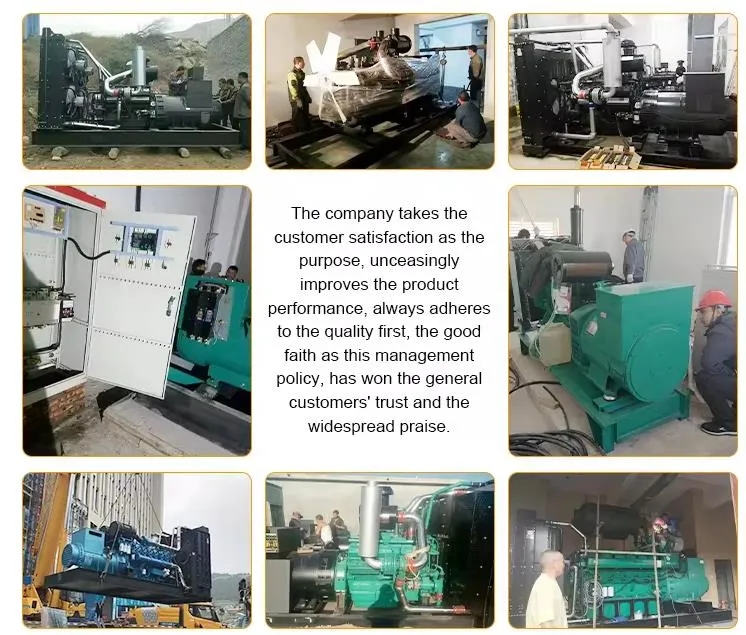Introduction
In today's fast-paced world, more and more people are seeking to disconnect from the grid and live off the land. Off- 400kw diesel generator offers a sense of freedom, self-sufficiency, and sustainability. However, one of the key challenges of off-grid living is the availability of reliable power sources. While renewable energy options such as solar panels and wind turbines are popular choices, diesel generators remain a crucial component of off-grid power systems. In this comprehensive guide, we will explore the role of diesel generators in off-grid living, their benefits, considerations, maintenance, and best practices for maximizing their efficiency and longevity.
The Importance of Diesel Generators in Off-Grid Living
Diesel generators play a critical role in off-grid living by providing a reliable source of backup power when renewable energy sources are insufficient. Off-grid homes often rely on solar panels, wind turbines, or hydroelectric systems to generate electricity. However, these renewable energy sources are intermittent and dependent on weather conditions. In times of low solar radiation, minimal wind, or reduced water flow, diesel generators can kick in to ensure a continuous power supply.
Another key benefit of diesel generators is their ability to provide high power output, making them suitable for running heavy-duty appliances and equipment commonly found in off-grid homes, such as refrigerators, freezers, water pumps, and power tools. Diesel generators are also known for their durability, longevity, and fuel efficiency, making them a cost-effective choice for off-grid living.
Considerations When Choosing a Diesel Generator for Off-Grid Living
When selecting a diesel generator for off-grid living, there are several factors to consider to ensure that you choose the right model that meets your power requirements and budget. Some of the key considerations include:
1. Power Output: Determine the total power consumption of your off-grid home to calculate the appropriate power output of the diesel generator. Consider both the starting and running wattage requirements of your appliances and equipment to avoid overloading the generator.
2. Fuel Efficiency: Diesel generators are known for their fuel efficiency compared to gasoline generators. Look for models with high fuel efficiency ratings to minimize operating costs and reduce environmental impact.
3. Noise Level: Consider the noise level of the diesel generator, especially if you have close neighbors or prefer a quieter living environment. Choose a generator with a low decibel rating for minimal noise disturbance.
4. Size and Portability: Evaluate the size and portability of the diesel generator to ensure it fits within your off-grid setup and can be easily transported if necessary. Consider factors such as weight, dimensions, and mobility features.
5. Reliability and Durability: Opt for a reputable brand with a proven track record of reliability and durability. A reliable diesel generator is essential for uninterrupted power supply in off-grid living conditions.
6. Maintenance Requirements: Consider the maintenance needs of the diesel generator, including regular servicing, oil changes, and filter replacements. Choose a model that is easy to maintain to avoid downtime and costly repairs.
Best Practices for Operating a Diesel Generator in Off-Grid Living
To maximize the efficiency and longevity of your diesel generator in off-grid living, it is essential to follow best practices for operation, maintenance, and fuel management. Here are some tips to help you get the most out of your diesel generator:
1. Regular Maintenance: Follow the manufacturer's maintenance schedule for routine servicing, oil changes, filter replacements, and overall inspection of the generator. Proper maintenance will ensure optimal performance and prevent breakdowns.
2. Keep Fuel Clean: Use clean and high-quality diesel fuel to prevent contamination and clogging of the generator's fuel system. Store fuel in a clean, dry, and well-ventilated area to maintain its quality.
3. Monitor Fuel Levels: Keep track of the diesel fuel levels in the generator's tank and refill it before it runs out to avoid disruptions in power supply. Consider installing a fuel gauge or monitoring system for accurate fuel level readings.
4. Exercise the Generator: Run the diesel generator regularly, even if it is not in use, to prevent fuel degradation, lubricate moving parts, and maintain battery charge. Regular exercise will also help identify any potential issues before they escalate.
5. Proper Ventilation: Install the diesel generator in a well-ventilated area to ensure adequate air circulation for cooling and exhaust ventilation. Proper ventilation will prevent overheating and carbon monoxide buildup.
6. Invest in Quality Components: Use high-quality fuel filters, air filters, and oil filters for the diesel generator to ensure optimal performance and longevity. Inferior components can lead to reduced efficiency and premature wear and tear.

7. Monitor Performance: Keep track of the generator's performance metrics, such as fuel consumption, running hours, and voltage output. Regularly monitor these metrics to detect any deviations and address them promptly.
Conclusion
Diesel generators are indispensable for off-grid living, providing a reliable source of backup power to ensure a comfortable and sustainable lifestyle. By considering key factors such as power output, fuel efficiency, noise level, size, reliability, and maintenance requirements, off-grid homeowners can select the right diesel generator that meets their specific needs. Following best practices for operating and maintaining a diesel generator will help maximize its efficiency, longevity, and performance, allowing off-grid residents to enjoy uninterrupted power supply for years to come. Embracing diesel generators as part of an off-grid power system paves the way for energy independence and self-sufficiency in remote locations.
